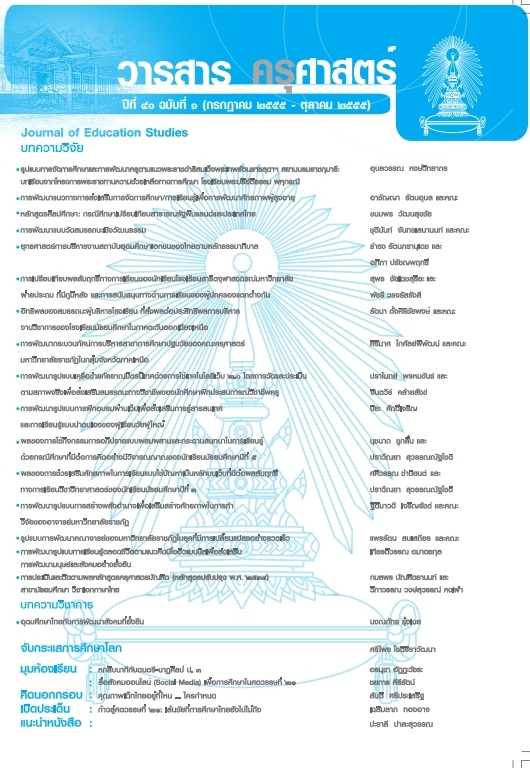การพัฒนากระบวนทัศน์การบริหารสาขาการศึกษาปฐมวัย ของคณะครุศาสตร์ มหาวิทยาลัยราชภัฏในกลุ่มจังหวัดภาคเหนือ
Abstract
การวิจัยครั้งนี้มีวัตถุประสงค์เพื่อ ๑) ศึกษาสภาพปัจจุบันและสภาพที่พึงประสงค์ของการพัฒนากระบวนทัศน์การบริหารสาขาการศึกษาปฐมวัย ๒) นำเสนอกระบวนทัศน์ที่พึงประสงค์ของการบริหารสาขาการศึกษาปฐมวัย และ ๓) นำเสนอกลยุทธ์การพัฒนากระบวนทัศน์การบริหารสาขาการศึกษาปฐมวัยของคณะครุศาสตร์ มหาวิทยาลัยราชภัฏในกลุ่มจังหวัดภาคเหนือ ใช้ระเบียบวิธีการวิจัยเชิงบรรยายประชากรคือ สาขาวิชาการศึกษาปฐมวัยของคณะครุศาสตร์ มหาวิทยาลัยราชภัฏในกลุ่มจังหวัดภาคเหนือ ผู้ให้ข้อมูลประกอบด้วย คณบดีคณะครุศาสตร์ ประธานสาขา อาจารย์ นักศึกษาภาคปกติชั้นปีที่ ๒ – ๕ บัณฑิตและผู้ใช้บัณฑิต จำนวน ๔๖๒ คน เครื่องมือที่ใช้ในการวิจัย ประกอบด้วย แบบสอบถามแบบสัมภาษณ์แบบไม่มีโครงสร้าง แบบตรวจสอบความเหมาะสมของกลยุทธ์และแนวคำถามการสนทนากลุ่ม การวิเคราะห์ข้อมูลเชิงปริมาณ ด้วยสถิติบรรยาย ได้แก่ ค่าความถี่ ค่าร้อยละ ค่าเฉลี่ย ส่วนเบี่ยงเบนมาตรฐานและทดสอบค่า “ที” (t-test) ที่ระดับนัยสำคัญ .๐๑ การวิเคราะห์ข้อมูลเชิงคุณภาพด้วยการวิเคราะห์เนื้อหาและการใช้เทคนิค Modif ied Priority Needs Index (PNImodif ied) ในการจัดลำดับความสำคัญของความต้องการจำเป็น
ผลการวิจัยพบว่า ๑) สาขาการศึกษาปฐมวัย คณะครุศาสตร์ มหาวิทยาลัยราชภัฏในกลุ่มจังหวัดภาคเหนือ บริหารสาขาตามกระบวนทัศน์การบริหารแบบเดิมมากกว่ากระบวนทัศน์การบริหารแบบใหม่ทั้งในสภาพปัจจุบันและสภาพที่พึงประสงค์ เมื่อพิจารณาเป็นรายด้าน พบว่า ค่าเฉลี่ยของสภาพปัจจุบันและสภาพที่พึงประสงค์ของการพัฒนากระบวนทัศน์การบริหารแบบเดิมมีค่าเฉลี่ยสูงกว่ากระบวนทัศน์การบริหารแบบใหม่ ๕ ด้าน จาก ๘ ด้าน ส่วนอีก ๓ ด้าน พบว่า ค่าเฉลี่ยของสภาพปัจจุบันและสภาพที่พึงประสงค์ของการพัฒนากระบวนทัศน์การบริหารแบบใหม่สูงกว่ากระบวนทัศน์การบริหารแบบเดิม๒) กระบวนทัศน์ที่พึงประสงค์ของการบริหารสาขาการศึกษาปฐมวัยของคณะครุศาสตร์ มหาวิทยาลัยราชภัฏในกลุ่มจังหวัดภาคเหนือ ที่อยู่ในระดับมากที่สุด คือ ด้านการสร้างจิตสำนึกในสังคม (ค่าเฉลี่ย = ปฐมวัย ที่อยู่ในระดับมากที่สุด คือ ๑) นำความรู้ที่ได้รับไปใช้ในการพัฒนาสังคม (ค่าเฉลี่ย = ๔.๖๐) และ๒) ปลูกฝังให้นักศึกษามีจิตสำนึกที่คำนึงถึงประโยชน์ของสังคมส่วนรวม (ค่าเฉลี่ย = ๔.๕๒) และ ๓) กลยุทธ์การพัฒนากระบวนทัศน์การบริหารสาขาการศึกษาปฐมวัยของคณะครุศาสตร์ มหาวิทยาลัยราชภัฏในกลุ่มจังหวัดภาคเหนือ ประกอบด้วย ๕ กลยุทธ์หลัก คือ ๑) กลยุทธ์การบริหารสาขาการศึกษาปฐมวัย๒) กลยุทธ์การบริหารงานวิชาการ ๓) กลยุทธ์การพัฒนาอาจารย์และนักศึกษา ๔) กลยุทธ์การพัฒนานวัตกรรมและเทคโนโลยี และ ๕) กลยุทธ์การพัฒนาเครือข่ายการศึกษาปฐมวัย ข้อเสนอแนะเพื่อการนำผลการวิจัยไปใช้ คือ ควรจะส่งเสริมให้สาขาการศึกษาปฐมวัยมีการพัฒนากระบวนทัศน์การบริหารในด้านต่างๆ ดังนี้ ๑) ด้านจิตสำนึกในสังคม ๒) ด้านยึดหลักธรรมาภิบาล ๓) ด้านสังคมฐานความรู้และ ๔) ด้านเครือข่าย
The objectives of this research were: 1) to study the current and desirable stateof the development of management paradigm in the Early Childhood Education Division;2) to present a desirable management paradigm of Early Childhood Education Division;and 3) to present strategies for the development of the management paradigm in theEarly Childhood Education Division, the Faculty of Education in Rajabhat Universities inthe Northern Region. This research used the descriptive research method. The populationconsisted of 462 people from the Early Childhood Education Division, the Faculty of Educationin Rajabhat Universities in the Northern Region. Informants included deans, chairmenof the branches, instructors, students year 2 – year 5, graduates, and users ofgraduates. The research tools consisted of questionnaires, unstructured interviews,investigation forms on strategy appropriateness, and questions for a focus groupdiscussion. Quantitative data were analyzed by means of descriptive statistics to acquirefrequency, percentage, mean and standard deviation. A t-test was employed to determinethe signif icant differences at the .01 level. Qualitative data were analyzed by a Modif iedPriority Needs Index (PNImodif ied) technique to prioritize the needs.
The f indings were as follows : 1) The Early Childhood Education Division, Facultyof Education in Rajabhat Universities in the Northern Region used a more traditionalmanagement paradigm than the new management paradigm in both the current anddesirable state. Each criteria showed that the average of the current and desirable stateof the traditional management paradigm were higher than the new managementparadigm only in 5 of the 8 factors. 2) The highest desirable management paradigm in Early Childhood Education Division, Faculty of Education in Rajabhat Universities inthe Northern Region was the conciousness in society (mean = 4.50). Issues that showedthe highest desirable management paradigm in the Early Childhood Education Divisionwere 1) the knowledge used in social development (mean = (4.60) 2) studentsshould cultivate the sense to consider the interests of society as a whole (mean = 4.52).and 3) Strategic development of the management paradigm in the Early ChildhoodEducation Division, the Faculty of Education in Rajabhat Universities in the NorthernRegion consisted of f ive main strategies: 1) the management strategy of the EarlyChildhood Education Division, 2) academic administration strategy, 3) teachers’ andstudents’ development strategy, 4) the development of innovation and technologystrategy, and 5) the development of early childhood education network strategy.
A recommendation for the implementation of research results is to fosterparadigm development in the following areas : 1) conciousness in society, 2) principlesof good governance, 3) knowledge-based society, and 4) network development.




